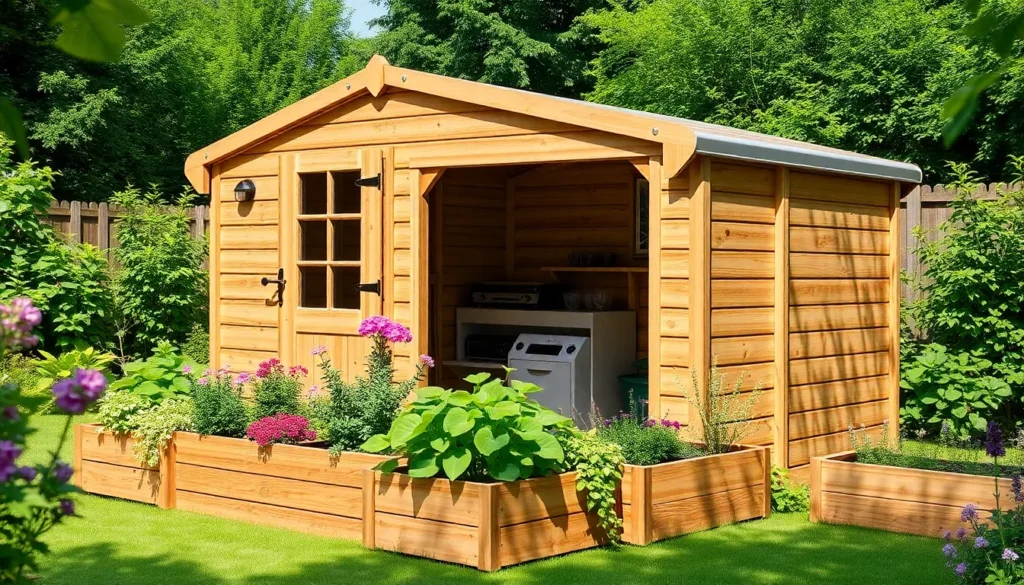In a world where plastic straws seem to have their own fan club and single-use bags are still making the rounds, the quest for sustainable living solutions has never been more urgent. But fear not! Embracing eco-friendly habits doesn’t mean trading in your coffee for kale smoothies or living in a treehouse. It’s about making small, smart choices that add up to big changes.
Table of Contents
ToggleOverview of Sustainable Living Solutions
Sustainable living solutions encompass various practices aimed at reducing environmental impact. These solutions range from simple changes in daily habits to adopting entire eco-friendly systems. Choosing reusable products instead of single-use items significantly minimizes waste. Implementing energy-efficient appliances not only lowers utility bills but also reduces energy consumption.
Adopting a plant-based diet contributes to lower greenhouse gas emissions and promotes healthier lifestyles. Utilizing public transportation or carpooling decreases the carbon footprint associated with individual car use. Installing solar panels provides renewable energy while often leading to long-term savings on energy costs.
Participating in local community gardens fosters biodiversity and can supply fresh produce while reducing reliance on industrial agriculture. Upcycling old materials into new products encourages creativity and reduces landfill contributions. Water conservation techniques, like rainwater harvesting, assist in managing valuable water resources.
Educating oneself about sustainable practices forms the foundation for informed decisions. Engaging family and friends in discussions about sustainability can amplify the impact of individual efforts. Supporting local businesses and products strengthens community resilience and reduces transportation emissions.
Identifying and prioritizing sustainable choices creates a ripple effect in the community. By integrating small, eco-friendly actions into daily routines, individuals contribute actively to a healthier planet. Implementing sustainable living solutions doesn’t require a complete lifestyle overhaul; consistent, mindful choices can lead to meaningful change.
Benefits of Sustainable Living
Sustainable living provides numerous advantages on several fronts, including environmental, social, and economic aspects. Each benefit plays a crucial role in improving quality of life and enhancing community resilience.
Environmental Benefits
Sustainable living reduces waste by encouraging the use of reusable products instead of disposable ones. It conserves natural resources through energy-efficient appliances and water-saving techniques. Adopting a plant-based diet contributes significantly to lowering greenhouse gas emissions associated with livestock farming. Installing solar panels on homes decreases reliance on fossil fuels, leading to cleaner air and a healthier environment. Participation in community gardens fosters biodiversity, enhancing ecosystems and creating green spaces.
Social Benefits
Sustainable living strengthens community ties and fosters collaboration among individuals. Engaging in local initiatives, like community gardens, encourages shared responsibility for the environment. Educating oneself and others about sustainability cultivates a more informed public. Involving family and friends in eco-friendly practices enhances awareness and instills a shared commitment to sustainability. Supporting local businesses not only contributes to economic resilience but also creates a sense of belonging within the community.
Economic Benefits
Embracing sustainable practices leads to long-term financial savings. Energy-efficient appliances often lower utility bills, allowing for more disposable income. Choosing local products reduces transportation costs and stimulates the local economy. Participating in community-supported agriculture provides fresh produce at lower prices than retail. Investing in sustainable solutions, such as solar energy, yields long-term returns, benefiting both the consumer and the planet.
Practical Sustainable Living Solutions
Numerous strategies exist for those looking to adopt sustainable living practices. These solutions can lead to significant improvements in environmental impact.
Energy Efficiency
Energy-efficient appliances and smart home technologies minimize energy consumption. Upgrading to LED lighting cuts energy use by up to 80%. Incorporating energy management systems can identify opportunities for further savings. Regular maintenance ensures appliances operate at peak efficiency. Sealing windows and doors prevents energy loss. Investing in renewable energy sources, like solar panels, enhances sustainability. These efforts contribute to reduced utility bills and a lower carbon footprint.
Water Conservation
Implementing water-efficient fixtures significantly lowers household water consumption. Low-flow showerheads and faucets can reduce water usage by 30% or more. Collecting rainwater for irrigation promotes responsible water management. Only running dishwashers and washing machines with full loads conserves water. Native landscaping requires less irrigation, adapting to local climates effectively. Educating family members about conscious water use further amplifies these efforts. Simple practices, like turning off taps while brushing teeth, can lead to meaningful reductions in water waste.
Waste Reduction
Reducing single-use plastics is vital for minimizing waste. Encouraging the use of reusable bags, containers, and bottles aligns with sustainable habits. Composting organic waste diverts materials from landfills and enriches soil. Participating in local recycling programs ensures proper waste management. Digital alternatives to paper reduce clutter and environmental impact. Supporting businesses that prioritize sustainable packaging contributes to a circular economy. Frequent decluttering also aids in responsible disposal and reduces accumulation of unnecessary items.
Sustainable Food Practices
Sustainable food practices significantly contribute to eco-friendly living. Implementing these methods can enhance food quality while reducing environmental impacts.
Organic Gardening
Organic gardening focuses on cultivating plants without synthetic pesticides or fertilizers. This approach supports biodiversity and fosters healthier soil. Choosing native plants enhances local ecosystems. Utilizing compost enriches garden soil, promotes growth, and reduces waste. Implementing crop rotation can prevent soil depletion and control pests naturally. Small urban gardens can yield fresh produce while minimizing transportation emissions.
Plant-Based Diets
Plant-based diets emphasize consuming fruits, vegetables, grains, and legumes. These diets lower greenhouse gas emissions compared to meat-centric options. They also require less land and water for production. Nutrient-dense plant foods boost overall health and reduce the risk of chronic diseases. Incorporating seasonal and local produce enhances sustainability and supports nearby farmers. Reducing animal product intake can meaningfully decrease individual carbon footprints.
Community Initiatives for Sustainable Living
Communities worldwide are implementing initiatives for sustainable living, creating impactful changes.
Local Sustainability Projects
Local sustainability projects frequently focus on reducing waste and promoting eco-friendly practices. Community gardens serve as green spaces that foster local biodiversity while providing residents access to fresh produce. Neighborhood clean-up days engage residents in removing litter from parks and streets, enhancing the local environment. Similarly, tool-sharing programs enable community members to lend and borrow equipment, reducing the need for purchases. Additionally, many neighborhoods are collaborating with local governments to establish recycling programs, which help divert waste from landfills and promote resource conservation. Collectively, these projects demonstrate how grassroots efforts can lead to significant improvements in local ecosystems.
Educational Programs
Educational programs play a vital role in promoting sustainable living practices. Workshops teach skills such as composting, urban gardening, and energy conservation methods. Schools increasingly incorporate sustainability into their curriculums, encouraging students to understand environmental issues and adopt eco-friendly habits. Local organizations often host events that connect experts with community members, allowing them to share knowledge about sustainable practices. Furthermore, initiatives such as community-owned renewable energy projects provide hands-on learning experiences while empowering residents to embrace greener energy solutions. These educational efforts foster greater awareness and support lasting change in community mindsets towards sustainability.
Embracing sustainable living solutions is a vital step toward a healthier planet. By making small changes in daily habits individuals can significantly reduce their environmental impact. From choosing reusable products to adopting energy-efficient technologies every action counts.
Community engagement plays a crucial role in fostering a culture of sustainability. Local initiatives and educational programs empower individuals to take charge of their ecological footprint while strengthening community ties.
Ultimately sustainable living isn’t just about personal choices; it’s about creating a collective movement toward a more resilient and eco-friendly future. With each mindful decision individuals can inspire others and contribute to a more sustainable world for generations to come.










